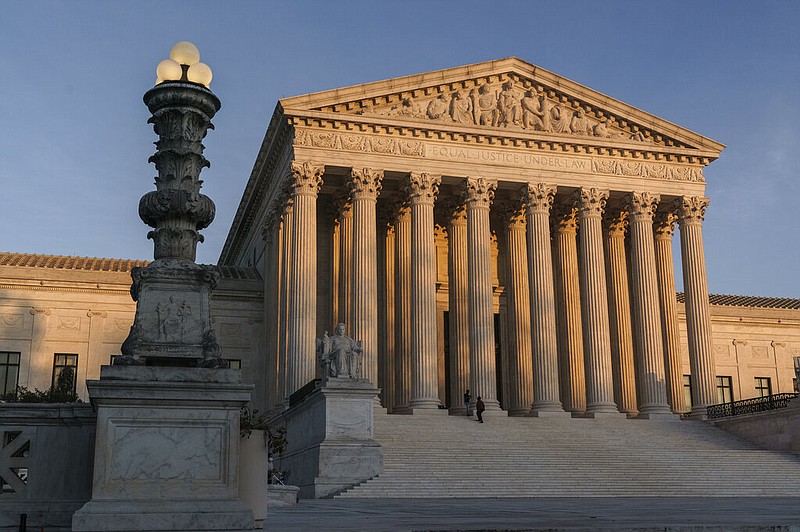WASHINGTON -- The U.S. Supreme Court should strike down Arkansas' Medicaid work requirements, lawyers challenging the provisions said Thursday.
The granting of waivers allowing the demonstration project, approved by the former Trump administration, was "arbitrary and capricious," in violation of the Administrative Procedure Act, the attorneys said in a brief filed with the nation's high court.
Oral arguments in the case, Arkansas v. Gresham, and a related case, Cochran v. Gresham, are set to be heard March 29.
Charles Gresham is one of the Arkansas Medicaid recipients who filed suit to challenge the restriction. Norris Cochran is the acting secretary for the U.S. Department of Health and Human Services.
The court also will consider a similar challenge to New Hampshire's waiver.
Under Section 1115 of the Social Security Act, the secretary can grant waivers for "experimental, pilot, or demonstration" projects that are "likely to assist in promoting the objectives" of the program.
The statutorily established objective of Medicaid is to "furnish ... medical assistance" for those "whose income and resources are insufficient to meet the costs of necessary medical services."
In an attempt to "transform" traditional Medicaid, then-federal Health and Human Services Secretary Alex Azar "proceeded to rubber-stamp waiver applications" for similar projects in a dozen states, including Arkansas, attorneys for Gresham stated.
"The projects, for the first time in the history of Medicaid, conditioned eligibility on compliance with work requirements, and did so as part of a package of restrictions, penalties, and reductions. The coverage loss threatened by these projects was massive," the brief stated.
"In Arkansas, more than 18,000 people lost coverage in just five months of partial implementation," it states.
In legal filings, Arkansas has argued that the state's demonstration project was "to test the hypothesis that conditioning Medicaid expansion benefits on work, education, or volunteering would lead to healthier outcomes for its beneficiaries."
After Arkansas Medicaid recipients sued, an Obama judicial appointee, U.S. District Judge James Boasberg of Washington, D.C., struck down the restrictions.
In a March 2019 ruling, Boasberg found Azar exceeded his authority in approving the requirements by failing to consider how they would affect the Medicaid program's goal of providing health coverage to needy people.
On Feb. 14, 2020, the U.S. Court of Appeals for the District of Columbia Circuit said federal approval of the plan had been "arbitrary and capricious." In a unanimous three-judge appellate ruling, the court found that in approving the project without considering its effect on Medicaid coverage, the Department of Health and Human Services violated the Administrative Procedures Act.
In December, the U.S. Supreme Court agreed to hear Arkansas' appeal.
On Jan. 19, Trump's last full day in office, his administration filed a brief with the Supreme Court defending the waivers.
"Those amendments test requirements that are designed to stretch limited state resources by facilitating the transitions of adult beneficiaries to commercial coverage and improving their health. Conserving scarce resources enables the States to expand or maintain coverage, and thus promotes the Medicaid statute's undisputed objective of providing health coverage to needy persons," they wrote.
Last month, 17 states signed an amicus brief siding with Arkansas. An 18th filed its own brief defending the waivers.
On Jan. 28, President Joe Biden issued an executive order instructing the department to consider reviewing any policies or waivers that "may reduce coverage under or otherwise undermine Medicaid" or "present unnecessary barriers."
Asked Jan. 26 about the Arkansas waivers, White House press secretary Jen Psaki said, "President Biden does not believe, as a principle, it should be difficult to -- for people to gain access to health care. And he's not -- he's not been supportive in the past, and is not today, of putting additional restrictions in place."
Last week, the administration told states that it would withdraw approval for work requirements.
Supporters and opponents of the work requirements said this week that they're uncertain how the change in policy will affect the ongoing litigation.
"We're aware of the letters that the Biden administration has sent to states. However, we had a deadline of today to file our response brief and certainly are complying with that deadline," said Jane Perkins, legal director with the National Health Law Program and one of the brief's authors.
At this point, both sides are preparing for the March 29 oral arguments.
"The one-size-fits-all Medicaid program doesn't work," Arkansas Attorney General Leslie Rutledge's office said in a written statement. "Our work-requirement initiative sought to create a partnership with able-bodied Arkansans to encourage well-being and personal responsibility while still providing healthcare coverage for those seeking gainful employment."
The attorney general's office is crafting a brief of its own and will file it soon, a spokeswoman said.

